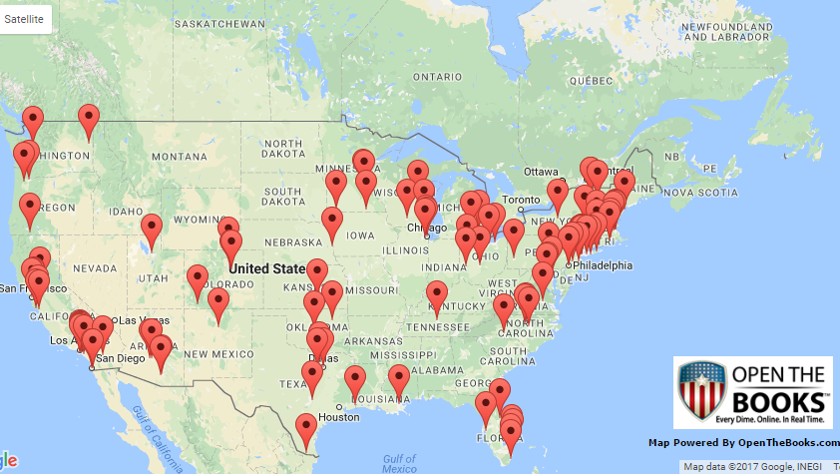“Federal Funding of America’s Sanctuary Cities” a report released this month by Openthebooks.com, includes Nashville as a sanctuary city that has received a total of $231,115,291.00 in direct payments and pass through federal grants that was part of the $26.741 billion federal dollars directed to 106 sanctuary cities.
The report includes an interactive map that includes the details of federal funding for each identified sanctuary city.
On January 25, 2017, President Trump issued an executive order “Enhancing Public Safety in the Interior of the United States” which included a directive to withhold non-mandatory federal funding to jurisdictions that elect not to comply with federal immigration laws regarding deportation of illegal aliens. Authors of the report suggest that the executive order was the impetus to collate the data and quantify how much federal funding could be in jeopardy.
Ironically, the report’s first page states:
OUR REPORT MADE POSSIBLE BY:
The “Federal Funding Accountability and Transparency Act of 2006” Sponsors: Sen. Tom Coburn (R-OK) & Sen. Barack Obama (D-IL) (Public Law 109-282, 109th Congress)
USAspending.gov, was the resulting mandate of this bipartisan legislation. The publicly accessible searchable website enables taxpayers to see how their money is being spent. Former senator Tom Coburn is the Honorary Chairman of Openthebooks.com
The report documents another key element in the controversy over sanctuary cities; that is, the absence of any definitive definition of sanctuary city. Some states like Tennessee, that have enacted statutes prohibiting sanctuary cities, require a local jurisdiction to have adopted a written ordinance or policy that expressly prohibits compliance with federal immigration law, before it is labeled a sanctuary city.
Other states like Georgia which adopted its first sanctuary city prohibition in 2009, last year, augmented its sanctuary cities statute after Kate Steinle was killed by an illegal alien in San Francisco. The Georgia definition of “sanctuary policy” now includes “any regulation, rule, policy, or practice adopted by a local governing body.”
Tennessee Sen. Mark Green (R-Clarksville) and Rep. Tilman Goins (R-Morristown) are trying to follow Georgia’s example and also include “practices” as indication that a local jurisdiction is operating in a way, even informally, that frustrates the enforcement of immigration laws.
The Green/Goins bill if passed, would add another strong element to Tennessee’s law. SB155/HB271 lists several different ways a sanctuary policy broadly defined, can be problematic including if it violates 8 U.S.C. 1373. This is the federal law that prohibits local and state governments and agencies from enacting laws or policies that limit communication with the Department of Homeland Security about “information regarding the immigration or citizenship status” of individuals.
Importantly, Openthebooks.com notes that in the absence of any definitive definition of sanctuary city, “the U.S. Department of Justice (DOJ) operationally enforces a legal definition. Under Federal Law 8 U.S.C. Section 1373, the DOJ defines sanctuary cities as a local government entity not reporting to federal authorities: ‘aliens in custody.’”
Shortly before leaving office, then Attorney General Loretta Lynch notified sanctuary cities that they must be in compliance with 8 USC Section 1373 or risk losing Justice Department funding even in the current fiscal year.






[…] report which includes Nashville as a sanctuary city, says that “operationally, the DOJ enforces a […]